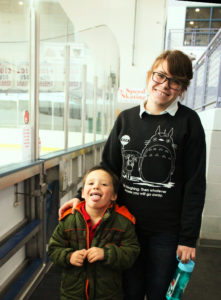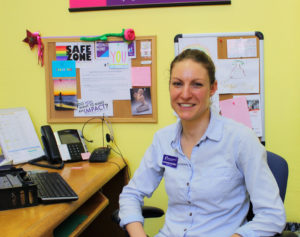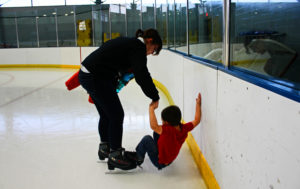Tags
Related Posts
Share This
Big Brothers Big Sisters
The Zamboni paints a fresh coat of ice across the rink at the Genoveva Chavez Community Center. As they wait for it to crystallize, Brianna Neumann laces up Rayne’s figure skates with expertise. Rayne stands on the toe-picked stilts, amazed at his own ability to balance on the blades. Neumann makes a comment about walking in high heels, and he says, “I know. I used to wear high heels when I was a girl.”

Brianna and Rayne hit up the ice rink after school. Photo by Amaya Hoke
Rayne says these things that are a little strange, but endearing. He also says, “I was in school for a hundred years,” and “I’m seven,” even though he is only six years old.
Big Brothers Big Sisters is a nationwide program dedicated to arranging one-on-one mentorships for children facing adversity. When Neumann, a junior Creative Writing and Literature major at the Santa Fe University of Art and Design, decided to volunteer in the Santa Fe community, she was matched with Rayne, her new, charming little brother. Neumann was inspired by a post circulating on social media that struck a chord with her. “I didn’t grow up in a super stable home,” Neumann says. “I always kind of wished I had something like that.”
Every child of the program has different needs. “Adversity is undefined,” Alexandra Mazares says. Mazares is the match support specialist of BBBS Mountain Region in New Mexico who paired Neumann and Rayne. She gives examples of the kinds of children she finds in her office: those without parents able to care for them for one reason or another; deceased parents; those with developmental or learning disabilities affecting their schooling or anything else that leaves a child feeling displaced. “We don’t close the door to any child or family that comes to us.”
BBBS enrolls ‘little siblings’ as young as five and enlists volunteers of all ages over 18. “We have a diverse pool of volunteers for a diverse group of kids,” Mazares says. With ‘bigs’ as old as 75, Mazares has a lot to work with in the art of matching a pair. “We try to get an idea of who this person is and what their values are. Why are they coming to the program and what do they hope to get out of it?” When matching, preference on both the side of the volunteer and of the family is balanced among common interests and hobbies. Of the many matches Mazares has made, one that particularly stands out to her was with a young girl just under five years old. “She had a hard time conceptualizing what we meant when we talked about a big brother or big sister,” Mazares says. “She asked if the big sister would come live with her and if she would have to share her room.” Mazares laughs. This is what a child worries about.

Alexandra Mazares matches pairs for Big Brothers Big Sisters. Photo by Amaya Hoke.
BBBS has two different volunteer programs. One is a school program in which the volunteer meets with the assigned sibling once a week during class breaks, approximately four hours a month, and the other, which Neumann is a part of, is community based. The community based program provides more one-on-one time for each duo, about eight hours a month, in which the Big can take the child to the park or the pool or even ice skating. Being a volunteer means being prepared to keep a child safe, coordinate with that child’s guardians and commit to at least a year in the organization. “We’re looking for a long term relationship that has the ability to make a lasting impact on a child,” Mazares says.
At this time, BBBS has a long waiting list, particularly of boys whose families are requesting a big brother due to a lack of male role models in the child’s life. But, as it has been for a while, BBBS has run short on big brothers. “A common barrier for men coming into the program is that they haven’t worked with kids in the past or haven’t had any childcare responsibilities, but we value everybody’s experience,” Mazares says. “Whatever it is [a volunteer] enjoys, we have a child that will fit [them].”
When they finally get onto the ice, Rayne clings to the wall. Rayne waited for five months to be matched with someone who could provide him the individual attention his grandmother isn’t able to provide alone. “He also just needs someone to do stuff with him that burns energy because he is crazy energetic,” Neumann says. Not long after entering the community center, Rayne sets off an alarm, licks a few foreign surfaces and lies on the ground. “The first time we met was kinda funny. Me and [Mazares] went to meet him and his grandma…and he comes running at full speed out of the classroom, and yells to his grandma, ‘Come on, we have to go meet my big sister!’”

Brianna helps Rayne up after he takes a fall. Photo by Amaya Hoke.
While Rayne is not ready to release the wall and venture into the center of the ice rink, Neumann oscillates beside him. She both encourages him to try letting go while supporting his decision not to. Neumann’s shirt reads, ‘Try laughing. Then whatever scares you will go away.’ When he does fall, she takes his hand and hoists him back up. “It’s just sobering,” Neumann says. “Rayne is happy and excited to do everything and he’s so young and joyful. It reminds me that everything is okay.”
To become a big brother or sister, visit the BBBS website or contact the Santa Fe office directly at 505-983-8360.






 Jackalope Magazine is the student magazine of Santa Fe University of Art and Design. Building on the interdisciplinary nature of our education, we aim to showcase the talent of our university and character of our city.
Jackalope Magazine is the student magazine of Santa Fe University of Art and Design. Building on the interdisciplinary nature of our education, we aim to showcase the talent of our university and character of our city.
Thank you so much for writing this article!